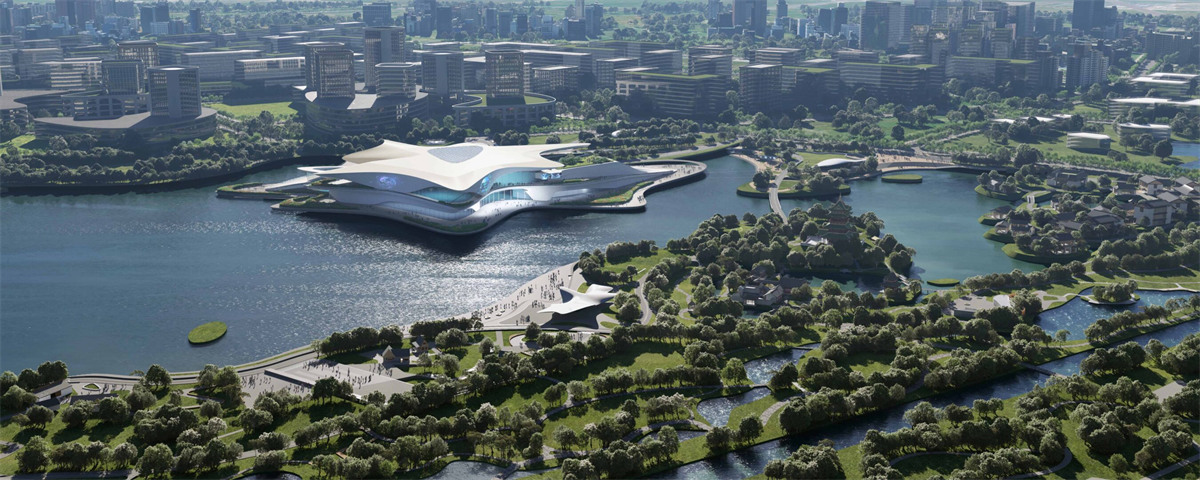
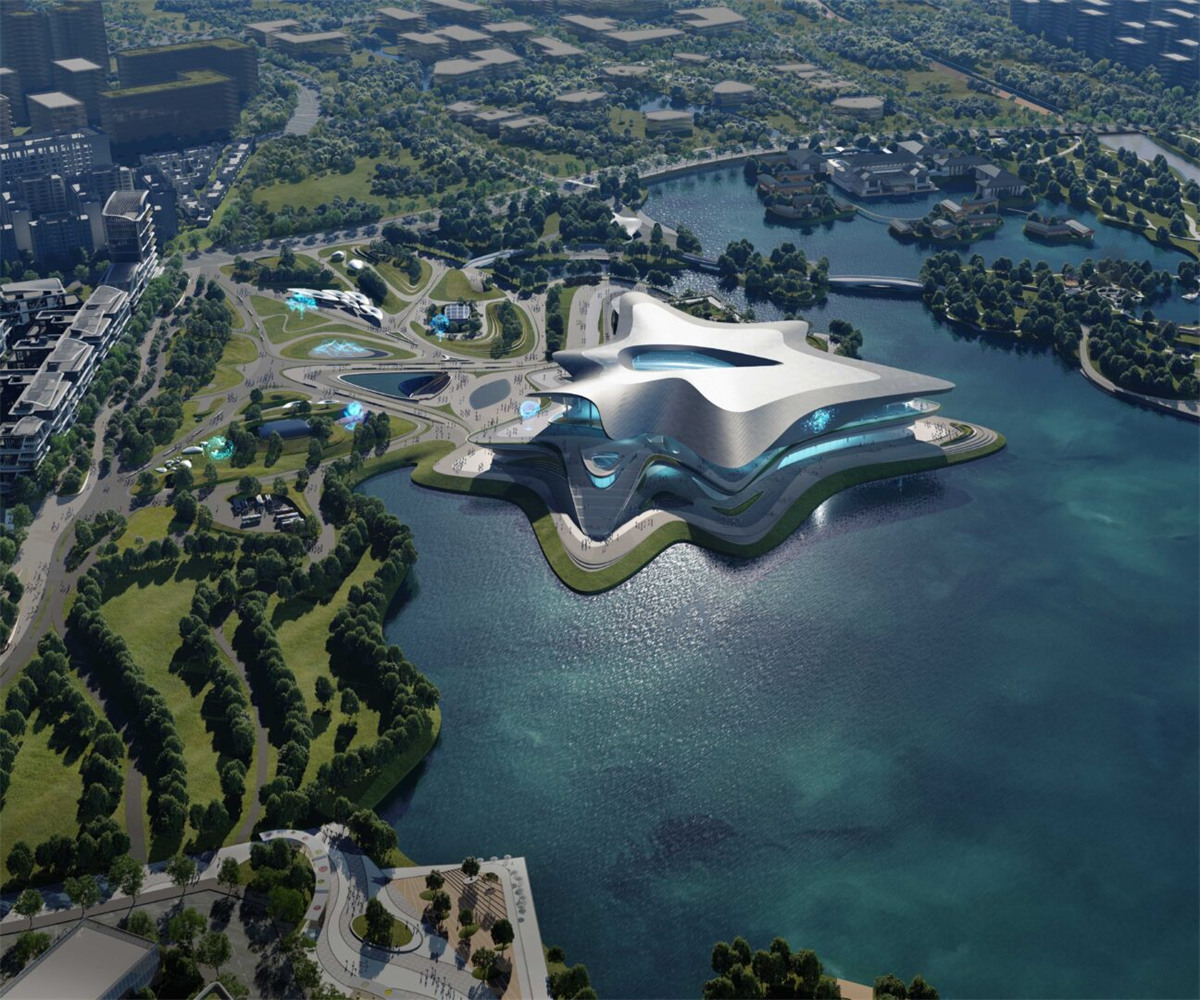
成都是中国领先的科幻小说创作孵化器。自1979年《科幻世界》在成都问世以来,其已成为国内许多知名科幻作家职业生涯的起点,是全球最受欢迎的科幻杂志。
The city of Chengdu is a leading incubator of science fiction writing in China. Launching the careers of many of the country’s most renowned authors, ‘Science Fiction World’ magazine has been published in the city since 1979 and is the genre’s most popular periodical worldwide.
地处群山之中的成都被茂密的森林环绕,其悠久的历史滋养了独特的地方文化,包括青铜时代三星堆文明的雕刻以及面具中的神秘景象和外星形态等。作为中国西南部四川省的省会,成都已发展为拥有超2000万居民的城市,并成为全球重要的科技创新和发展中心。
Surrounded by mountain ranges and forests, Chengdu cultivated a unique local culture rooted in its rich history that includes the mystical visions and extraterrestrial forms within the carvings and masks of the Bronze Age Sanxingdui civilization. The capital of Sichuan province in Southwest China, Chengdu has grown to a city of over 20 million residents and become important global center of scientific innovation and research. The new Chengdu Science Fiction Museum is situated on Jingrong Lake within the Science & Innovation New City of Chengdu’s Pidu District. Integrating with the natural landscapes along the lakeshore, the museum’s design defines nodes of activity connected by pedestrian routes that extend from the city and adjacent metro station through the surrounding parkland into the heart of the building; creating a journey of discovery that weaves between indoor and outdoor plazas at multiple levels to link the museum’s exhibition galleries, educational facilities, cafes and other amenities.

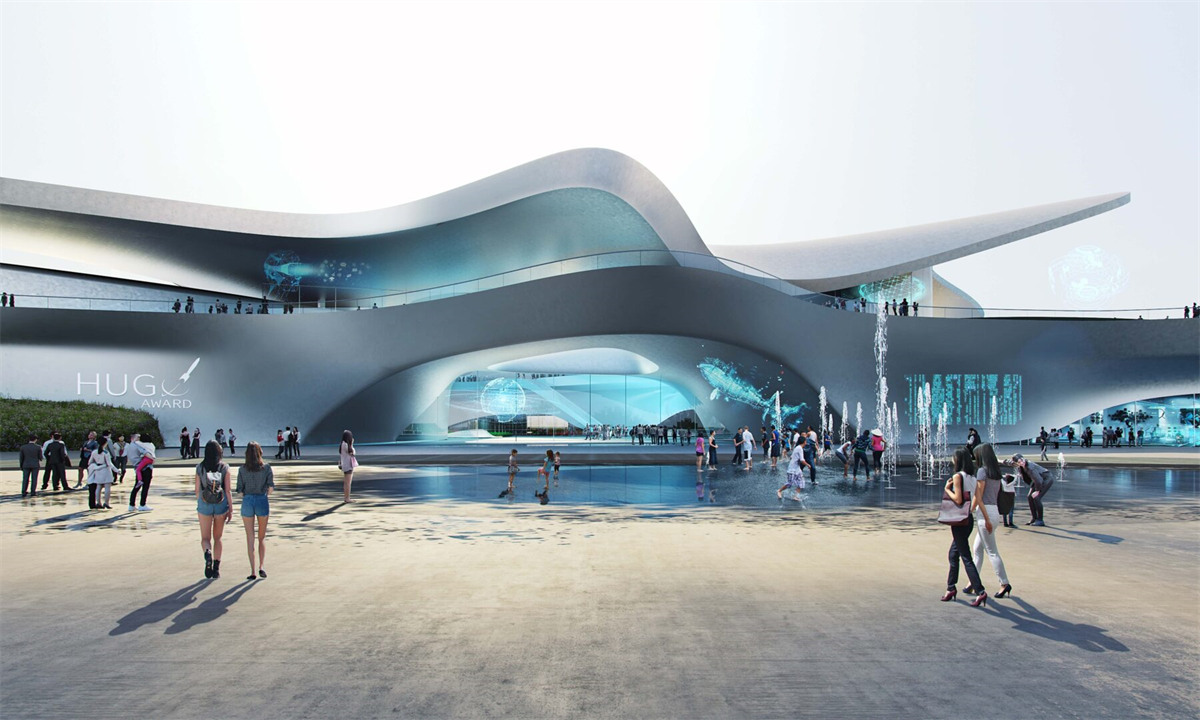
建筑师将清晰的规划和功能结合在一起的同时呼应了其独特的场地条件。成都科幻馆仿佛漂浮在湖面,流体线条从其中心辐射,模拟了以一颗恒星为中心不断膨胀的星云,将能量场分散到许多不同的活动区域,并引导访客通过这个入口在现实生活与想象力之间建立连接。
Bringing together programmatic and functional clarity while responding to its unique site conditions, the museum appears to float above from the surface of the lake. The fluid forms of its roof radiate from a central point within, emulating an expanding nebula cloud with a star at its center – transforming the museum into a ‘star cloud’ that disperses energy fields into its many different zones; guiding visitors through a portal that connects our lived experience with our imagination.
建筑面积约5.9万平米的科幻馆包括展览馆、剧院、会议厅和配套的附属空间,最大限度实现了场馆自身的灵活性和适应性,可举办各种展览、会议和活动。其采光充足的中庭科幻之眼天窗及其面向壮观的西岭山脉的巨型窗户将室内与周围环境连接起来。
Incorporating maximum flexibility to host the widest variety of exhibitions, conferences and events, the 59,000 sq. m Chengdu Science Fiction Museum includes exhibition galleries, theatre, conference hall, and supporting ancillary spaces. The sky-lit central atrium and it’s large window facing the spectacular Xiling Mountain connect the museum’s interiors with their surrounding environment.
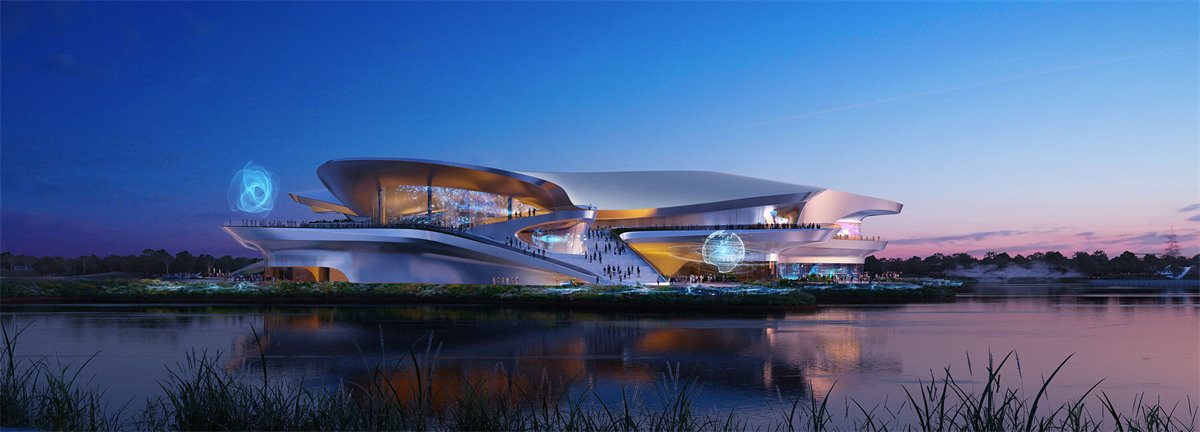

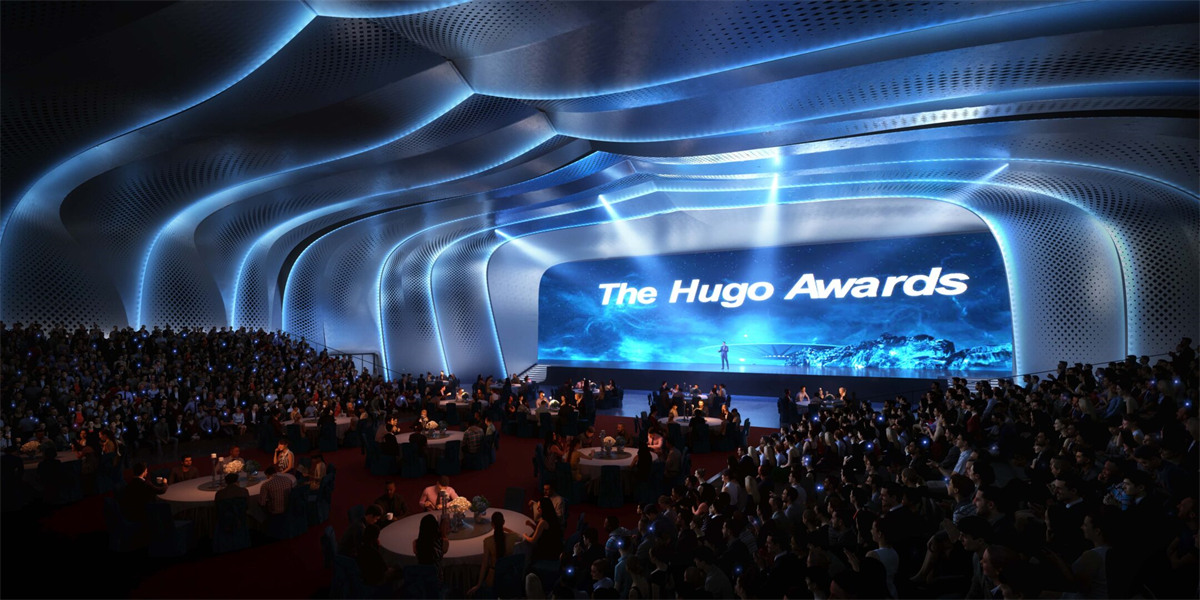
科幻馆的设计符合中国绿色建筑三星级标准,通过详尽的数字建模分析开发,以最大限度提高构成、场地条件、太阳辐射和结构的效率。自然混合通风进一步优化了成都温和的亚热带气候,为访客和员工提供全年舒适的环境。科幻馆大型顶篷的尺寸经过精确计算,可在夏季为玻璃幕墙遮阳。
Meeting the highest 3 Star standards of China’s Green Building Program, the museum’s design has been developed through detailed digital modelling analysis to maximize efficiencies in composition, site conditions, solar irradiation and structure. Natural hybrid ventilation optimizes Chengdu’s mild subtropical climate to provide comfort for visitors and staff throughout the year. Photovoltaics embedded within the museum’s large roof canopy contribute to meeting the building’s energy demands. The dimensions of this roof have been calculated to shade the glazed facades in summer.
科幻馆将景观与本土植物融合在一起,可收集和储存雨水以进行自然过滤和再利用。菁蓉湖沿岸将重建一块湿地,成为成都可持续排水系统不可或缺的一部分,可减少洪水并增加整座城市的生物多样性。
Landscaped with plants native to the region, the design collects and stores rainwater for natural filtration and reuse, enabling Jingrong Lake to become an integral part of Chengdu’s sustainable drainage system that will mitigate flooding and increase biodiversity throughout the city.
成都科幻馆将为成都打造一个充满活力的创新中心,以独特的方式衔接过去-现在-未来。该馆将在今年下半年举办一年一度的世界科幻大会。创立于1939年的科幻大会是世界上最大的科幻届活动,其最重要的创意奖——雨果奖——将在科幻馆的剧院揭晓。这将是世界科幻大会首次在中国举办,也是其第二次在亚洲举办。
Connecting the past, present and future, the new Chengdu Science Fiction Museum will become a vibrant center of innovation and gathering place for the city. Later this year, the museum will be the main venue of the World Science Fiction Convention (Worldcon) and host the Hugo Awards.
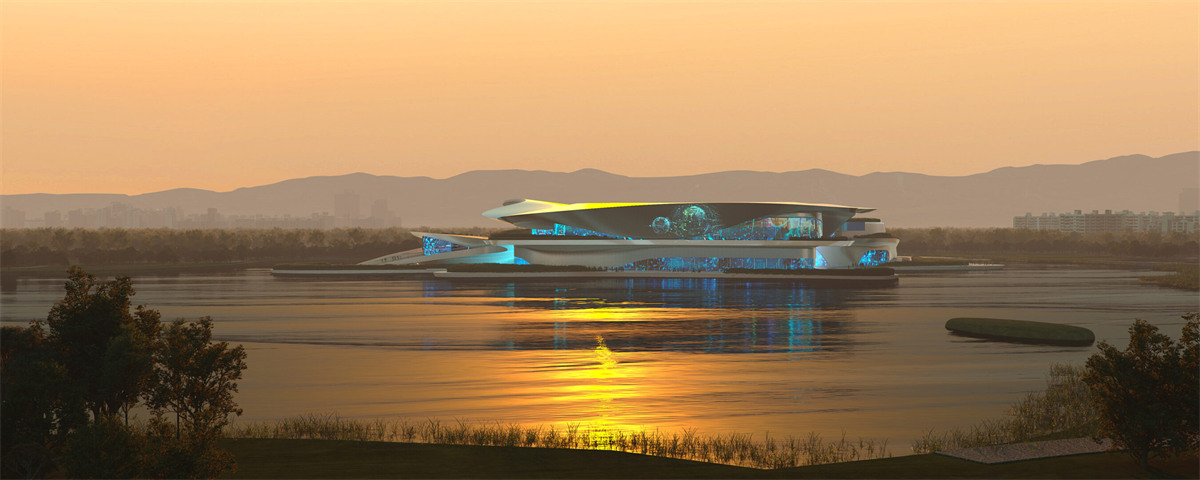
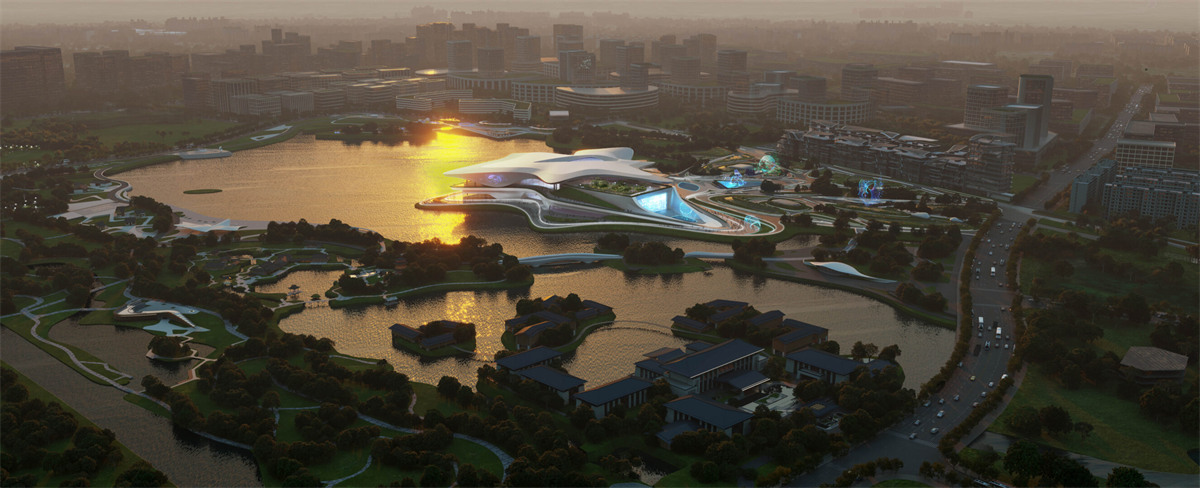

Architect: Zaha Hadid Architects (ZHA)
Consultants
Executive Architect: Zaha Hadid Architects
Local Architect: 中国建筑西南设计研究院 China South West Architecture Design Institute
Structural Engineers:中国建筑西南设计研究院 China South West Architecture Design Institute
General Contractor:中建三局集团有限公司 China Construction Third Engineering Bureau Group
Façade Engineering:中国建筑西南设计研究院 China South West Architecture Design Institute
M&E Engineering:中国建筑西南设计研究院 China South West Architecture Design Institute
MEP:中国建筑西南设计研究院 China South West Architecture Design Institute
Fire Engineer: 中国建筑西南设计研究院 China South West Architecture Design Institute
Landscape Consultant:杭州园林设计院 Hangzhou Landscape Design Institute
Lighting Design: LIGHTDESIGN, BPI
Acoustic Consultant:上海建筑设计研究院SIADR
Site Supervision:四川飞红工程管理咨询有限公司 Sichuan Feihong Engineering Management Consulting Co.
Project Management: 华润置地 CR LAND
Interior Local Design Institute: 上海建筑设计研究院 SIADR
Exhibition Design Consultant: 成都市科幻协会 Chengdu Science Fiction Society
(SEE MORE) Zaha Hadid Architects
